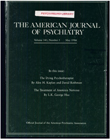Unrecognized organic mental disorders in survivors of cardiac arrest
Abstract
Long-term survivors of cardiac arrest may suffer from mild cerebral impairment manifested primarily by personality changes and behavioral symptoms that can be mistaken for emotional responses to illness. The authors report six cases that illustrate the clinical problem of differentiating depression from organic brain dysfunction in this population. The diagnosis is facilitated by observation over time and by information from the spouse on baseline and current function. Chronicity, dysinhibition, apathy, and disturbances of judgment and insight indicate cerebral dysfunction. The accurate diagnosis of cerebral impairment after cardiac arrest is essential to the rehabilitation process.
Access content
To read the fulltext, please use one of the options below to sign in or purchase access.- Personal login
- Institutional Login
- Sign in via OpenAthens
- Register for access
-
Please login/register if you wish to pair your device and check access availability.
Not a subscriber?
PsychiatryOnline subscription options offer access to the DSM-5 library, books, journals, CME, and patient resources. This all-in-one virtual library provides psychiatrists and mental health professionals with key resources for diagnosis, treatment, research, and professional development.
Need more help? PsychiatryOnline Customer Service may be reached by emailing [email protected] or by calling 800-368-5777 (in the U.S.) or 703-907-7322 (outside the U.S.).



